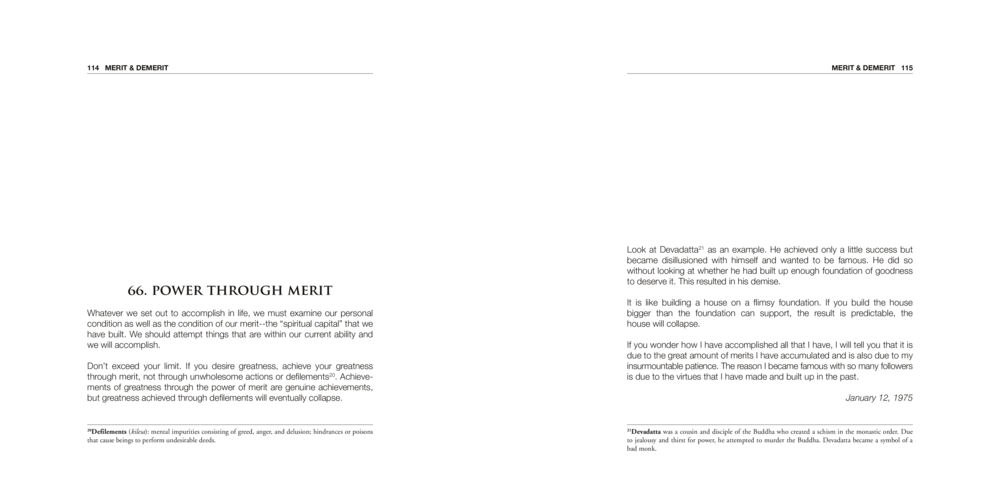Power Through Merit : หน้า 58/135
Khun Yai’s Teachings : หน้า 58/135 Discover the importance of personal merit and spiritual capital in achieving greatness without defilements.
0 ครั้ง

สรุปเนื้อหา
In life, it is essential to assess both our personal condition and the merit we have accumulated. Striving for greatness should be rooted in good actions rather than desires driven by greed, anger, or delusion. The story of Devadatta serves as a cautionary tale about seeking fame without a robust foundation of goodness, ultimately leading to downfall. The author attributes their accomplishments to the accumulation of merit and patience, contrasting true success with the potential collapse of ambitions built on shaky grounds.
หัวข้อประเด็น
-Importance of merit
-Risks of unchecked ambition
-Lessons from Devadatta
-Spiritual capital in personal growth
-True achievements vs. illusory success
ข้อความต้นฉบับในหน้า
66. POWER THROUGH MERIT
Whatever we set out to accomplish in life, we must examine our personal
condition as well as the condition of our merit—the “spiritual capital” that we
have built. We should attempt things that are within our current ability and
we will accomplish.
Don’t exceed your limit. If you desire greatness, achieve your greatness
through merit, not through unwholesome actions or defilements(i). Achieve-
ments of greatness through the power of merit are genuine achievements,
but greatness achieved through defilements will eventually collapse.
“PDefilements (klesa): mental impurities consisting of greed, anger, and delusion; hindrances or poisons that cause beings to perform undesirable deeds.
Look at Devadatta(i)” as an example. He achieved only a little success but
became disillusioned with himself and wanted to be famous. He did so
without looking at whether he had built up enough foundation of goodness
to deserve it. This resulted in his demise.
It is like building a house on a flimsy foundation. If you build the house
bigger than the foundation can support, the result is predictable, the
house will collapse.
If you wonder how I have accomplished all that I have, I will tell you that it is
due to the great amount of merit I have accumulated and is also due to my
insurmountable patience. The reason I became famous with so many followers
is due to the virtues that I have made and built up in the past.
January 12, 1975
“Devadatta(i)” was a cousin and disciple of the Buddha who created a schism in the monastic order. Due
to loyalty and for power, he attempted to murder the Buddha. Devadatta became a symbol of a
bad trait.
หน้าหนังสือทั้งหมด
หนังสือที่เกี่ยวข้อง
Load More







































































































































